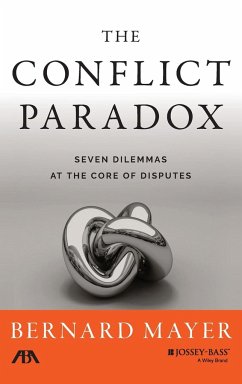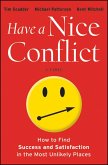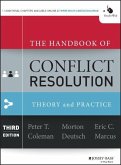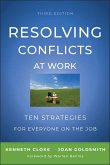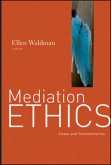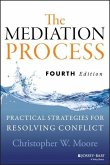The Conflict Paradox is a comprehensive guide to overcoming conflict to arrive at a satisfying resolution, outlining the seven major dilemmas that conflict resolution practitioners face every day. Readers will find expert guidance toward getting to the heart of the conflict, along with practical tools and techniques for more successful intervention. Using stories, experiences, and exercises to bring these concepts to life, the author provides actionable advice for defusing tensions and clearing contradictions.
* Examine the contradictions at the center of almost all conflicts
* Explore the seven dilemmas: Competition and Cooperation; Optimism and Realism; Avoidance and Engagement; Principle and Compromise; Emotions and Logic; Impartiality and Advocacy; Autonomy and Community
* Discover the tools and techniques that make conflicts less of a hurdle to overcome
The Conflict Paradox provides a roadmap to effective conflict resolution.
Find the roadmap to the heart of the conflict
The Conflict Paradox is a guide to taking conflict to a more productive place. Written by one of the founders of the professional conflict management field and co-published with the American Bar Association, this book outlines seven major dilemmas that conflict practitioners face every day. Readers will find expert guidance toward getting to the heart of the conflict and will be challenged to adopt a new way to think about the choices disputants face,. They will also be offered practical tools and techniques for more successful intervention. Using stories, experiences, and reflective exercises to bring these concepts to life, the author provides actionable advice for overcoming roadblocks to effective conflict work.
Disputants and interveners alike are often stymied by what appear to be unacceptable alternatives,. The Conflict Paradox offers a new way of understanding and working with these so that they become not obstacles but opportunities for helping people move through conflict successfully..
Examine the contradictions at the center of almost all conflicts
Learn how to bring competition and cooperation, avoidance and engagement, optimism and realism together to make for more power conflict intervention
Deal effectively with the tensions between emotions, and logic, principles and compromise, neutrality and advocacy, community and autonomy
Discover the tools and techniques that make conflicts less of a hurdle to overcome and more of an opportunity to pursue
Conflict is everywhere, and conflict intervention skills are valuable far beyond the professional and legal realms. With insight and creativity, solutions are almost always possible. For conflict interveners and disputants looking for an effective and creative approach to understanding and working with conflict , The Conflict Paradox provides a powerful and important roadmap for conflict intervention.
* Examine the contradictions at the center of almost all conflicts
* Explore the seven dilemmas: Competition and Cooperation; Optimism and Realism; Avoidance and Engagement; Principle and Compromise; Emotions and Logic; Impartiality and Advocacy; Autonomy and Community
* Discover the tools and techniques that make conflicts less of a hurdle to overcome
The Conflict Paradox provides a roadmap to effective conflict resolution.
Find the roadmap to the heart of the conflict
The Conflict Paradox is a guide to taking conflict to a more productive place. Written by one of the founders of the professional conflict management field and co-published with the American Bar Association, this book outlines seven major dilemmas that conflict practitioners face every day. Readers will find expert guidance toward getting to the heart of the conflict and will be challenged to adopt a new way to think about the choices disputants face,. They will also be offered practical tools and techniques for more successful intervention. Using stories, experiences, and reflective exercises to bring these concepts to life, the author provides actionable advice for overcoming roadblocks to effective conflict work.
Disputants and interveners alike are often stymied by what appear to be unacceptable alternatives,. The Conflict Paradox offers a new way of understanding and working with these so that they become not obstacles but opportunities for helping people move through conflict successfully..
Examine the contradictions at the center of almost all conflicts
Learn how to bring competition and cooperation, avoidance and engagement, optimism and realism together to make for more power conflict intervention
Deal effectively with the tensions between emotions, and logic, principles and compromise, neutrality and advocacy, community and autonomy
Discover the tools and techniques that make conflicts less of a hurdle to overcome and more of an opportunity to pursue
Conflict is everywhere, and conflict intervention skills are valuable far beyond the professional and legal realms. With insight and creativity, solutions are almost always possible. For conflict interveners and disputants looking for an effective and creative approach to understanding and working with conflict , The Conflict Paradox provides a powerful and important roadmap for conflict intervention.

